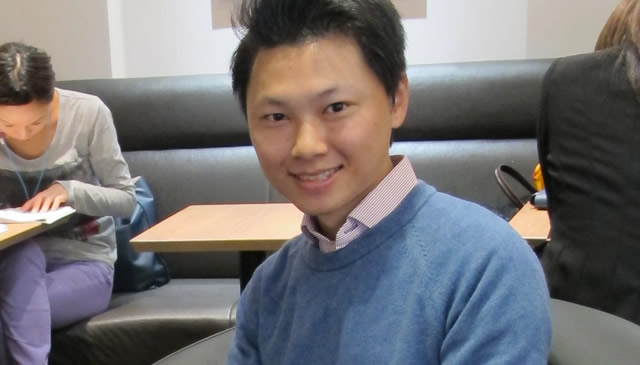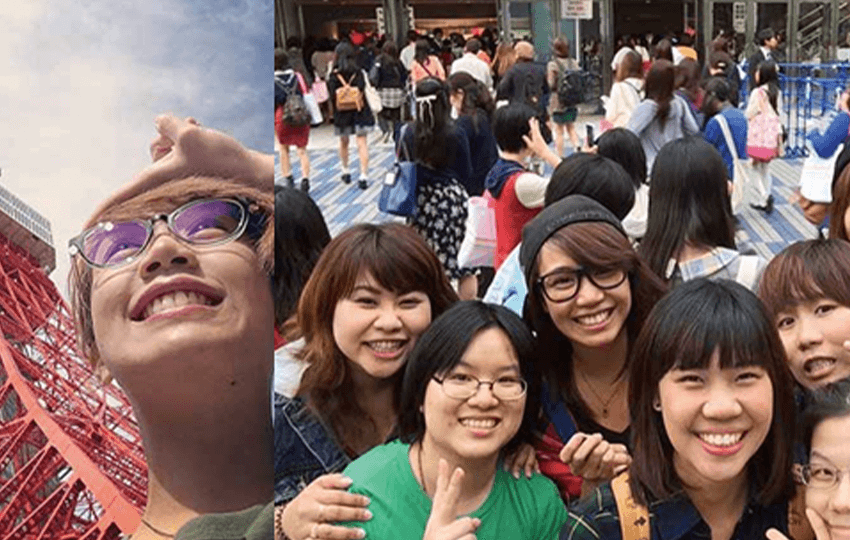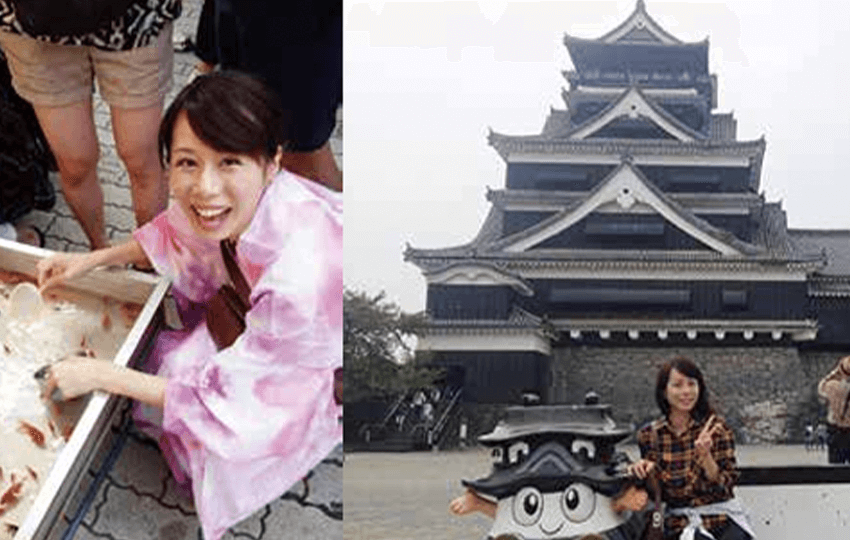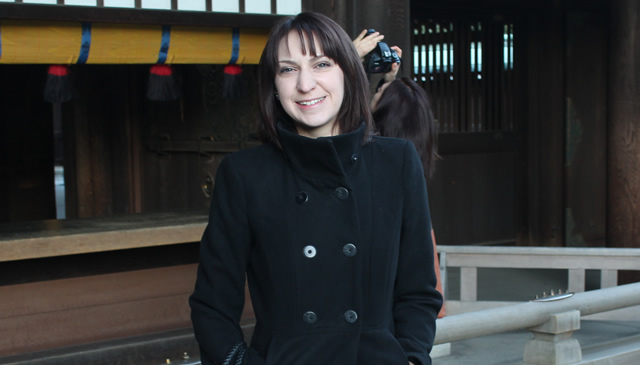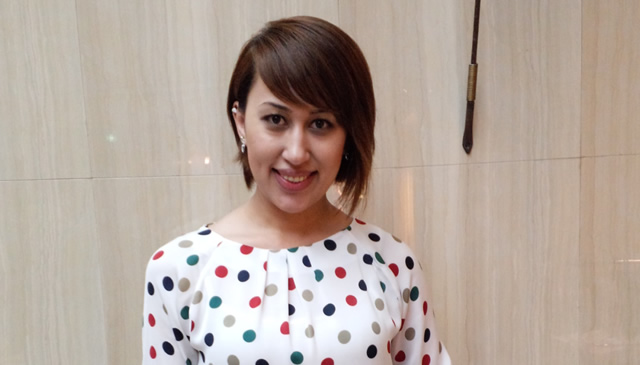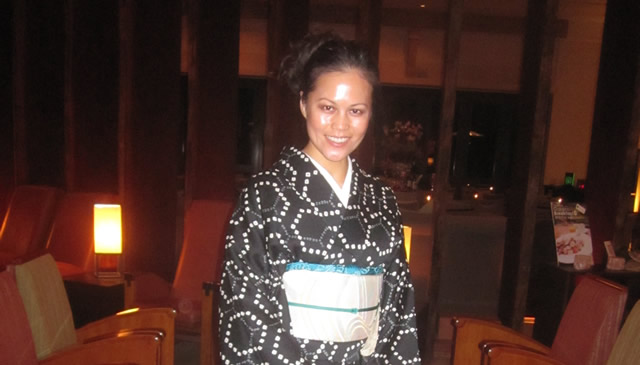-
[From February Issue 2015]
RIO Tina
“When I wanted to learn a second foreign language, I decided to choose Japanese,” RIO Tina from China says. “Japan was one of the countries I found appealing. I found it interesting that Japan, while being a developed country, properly preserved its old traditions. In addition, Japanese and Chinese businesses are tightly bound together.”
After graduating from Shanghai University, Rio came to Japan in March 2008 and studied Japanese at Aichi International Academy in Nagoya City, Aichi Prefecture for two years. “It was a very productive two years. Not only was I able to study Japanese, but I was very satisfied with the level of support I received in my everyday life, which made my stay in Japan very secure,” says Rio.
By continuing to work a variety of part time jobs while going to school, Rio’s Japanese ability improved greatly. Wanting to further her Japanese studies, Rio enrolled in the junior year of Nanzan University Business Administration Department in 2010 and majored in management environment theory. “The joy of studying a language is that you can easily gauge how much you have advanced,” says Rio.
“I was glad when I was able to give directions around town to a Japanese person. In addition, I became able to properly articulate my thoughts in a sentence. When my composition won Takushoku University’s International Collaboration and International Understanding Award, I was very happy,” says Rio. “I think katakana is very difficult. Even when the word derives from English, I had a hard time as the pronunciation can be completely different. In addition, many names for people and places are read differently, which was puzzling.”
Rio says she loves everything about Japanese food. “I especially like white flesh fish, oyster, and sushi. I often go to the standing sushi restaurants. Also, I always admire Japan’s clean environment and the courtesy of its people.”
Rio now does sales work for a specialist food wholesaler in Tokyo. She is in charge of alcoholic beverages and corresponds with the major Japanese supermarket buyers. She uses Japanese at work and also English when dealing with imports. She says it is pleasant to suggest a product or sales space, while taking buyers’ interests into account.
“I don’t deal well with the crowds in Tokyo. Rush hour here reminds me of my hometown, Shanghai,” Rio says with a smile. To recharge her batteries after a stressful work week and to get away from the crowds, on her days off she drives to the beach or plays golf with friends and colleagues.
“There are many differences between China and Japan. In China it’s important to assert yourself strongly; you’ll lose out if you do not state your intentions in front of others. In contrast, in Japan it’s normal to state your opinion after assessing the situation. As they say in Japan, I feel it’s important to ‘read between the lines.’ At times people can be excessively sensitive to the moods of others, but it’s also a virtue,” Rio says.
Aichi International Academy[2015年2月号掲載記事]呂 天吟さん
「第二外国語を身につけたいと思ったとき、日本語にしようと思いました」と中国出身の呂天吟さんは話します。「日本は魅力的だと思う国の一つでした。先進国でありながら、昔の文化などをきちんと保っているところが興味深いと思ったからです。また、日本と中国のビジネスは切っても切れない関係です」。
呂さんは上海大学を卒業後、2008年3月に来日。愛知県名古屋市にある愛知国際学院で2年間日本語を勉強しました。「とても充実した2年間でした。日本語の勉強だけでなく、生活面のサポートも満足いくものでしたので、来日間もない私にとってとても頼りになる存在でした」と呂さん。
学校に通いながら様々なアルバイトを続け、呂さんの日本語能力は大きくのびました。さらに日本語で勉強したくなった呂さんは、2010年、南山大学経営学部3年に編入、経営環境論を専攻しました。「語学の楽しさは自分がどのくらい成長しているかすぐ確認できるところです」と呂さん。
「街で日本の方に道案内ができたときにはうれしかったです。また、自分の思いをきちんと文章にすることができるようになりました。作文が拓殖大学の国際協力・国際理解賞を受賞したときは本当によかったと思いました」と呂さん言います。「大変だと思うのはカタカナです。英語が由来のものでも発音が全然違うと苦労しました。また、人名や地名では変わった読み方が多く、戸惑いました」。
呂さんは和食すべてが好きと話します。「特に白身魚、カキ、おすしが好きです。立ち食いすし店にはよく行きます。また、きれいな環境と人の礼儀正しさにはいつも感心しています」。
現在、呂さんは東京にある食品専門卸の会社で、営業の仕事をしています。担当は酒類で、日本の大手スーパーマーケットのバイヤーとやり取りをしています。仕事では日本語を、輸入先によっては英語を使っています。バイヤーの声を常に聞きながら、商品や売場の提案をするのは楽しいと話します。
「東京の人混みはちょっと苦手です。ラッシュ時は地元、上海を思い出します」と笑います。仕事と人混みの疲れを癒すため、休日は友達や会社の同期の人とドライブで海へ行ったり、ゴルフに行ったりしています。
「中国と日本の違いはたくさんあります。中国は自己主張が強く、人より先に意志表示しないと負けになります。一方、日本は状況を見てから意見を言うことが一般的です。いわゆる『空気を読む』ことが大切と感じます。過剰なほど相手の気持ちを気にするところもありますが、それも美徳の一つだと考えています」と呂さんは話します。
愛知国際学院 -
Improving Japanese Ability by Being the Only Non-Japanese in the Workplace
- Hiragana Times
- Jun 23, 2015
[From January Issue 2015]
Lewis Winglam PONG
“I started studying Japanese when I came to Japan in September, 2013. I took the N3 (Japanese Language Proficiency) examination in December and passed. I took N2 in July, this year, and passed again. This month I took N1,” says Lewis Winglam PONG, from Hong Kong. In 2013 he began working at the Japanese head office of Sojitz Cooperation. Now he is working as an investment advisor in the structured finance division.
Pong majored in risk management and finance at Hong Kong University. Then, he went to study finance and management at a graduate school in the U.K., staying on to do an internship for two months. Before long, he got anxious about his parents and returned to Hong Kong, where he started job hunting. Then, he bumped into a friend who was employed by Sojitz who told him about working conditions there.
“What impressed me was that the company was hiring people who were not able to speak Japanese at all and giving them six months intensive Japanese instruction,” recalls Pong. Pong did some research into Sojitz. Learning that the company was a general trading company of a type unique to Japan, and that it was doing businesses in various fields around the world, he was intrigued.
“I became curious about Japan, too. Japan is poor in natural resources and suffers from many natural disasters, such as earthquakes. Despite suffering heavy damage in World War II, Japan regenerated itself in only a few decades to become the second biggest economy in the world,” says Pong.
Pong applied for a job at Sojitz and was hired. There, he received intensive Japanese instruction. “During the first three months, I received lessons to prepare for the N3 test in the morning at Waseda University and studied in a group of two to three people with one Japanese language teacher in the afternoon. Over the next three months, I studied with a Japanese language teacher in the morning and did on-the-job training, in other words learning Japanese from my colleagues while we worked.”
“Since I’m surrounded by Japanese people at work and the majority of business is in done in Japanese, it’s quite a challenge. For instance, at meetings, everybody speaks quietly and it’s sometime hard for me to catch what they’re saying. There were occasions when I could finally understand what the meeting was about after reading the minutes afterwards. In Hong Kong and the U.K., people try to show how confident they are by expressing their opinions in a loud voice, but in Japan it is a virtue to speak modestly. Also, when you have an objection, rather than say ‘I object,’ it’s customary in Japan to mention the reasons against it,” says Pong, smiling wryly.
He also had trouble with honorific expressions. “It is much more complicated than in Cantonese. In Japan you have to adjust your level of respect depending on whether you are talking to your manager or to a senior colleague. With people outside your company, you have to use another set of expressions. Honorific expressions used for communicating with them change according to which side is asking for a favour. Now, however, I naturally produce honorifics whenever I feel a sense of respect,” he says.
“I am hooked on snowboarding, which I started doing last year. I’m also enjoying golf,” says Pong, discussing his private life. “I used to think that if I’d gotten a job in Hong Kong, I wouldn’t have had such language difficulties. But now I feel that through studying Japanese I have widened my job opportunities. If I improve my Japanese, I’ll be given greater responsibility at work.”
Sojitz Cooperation
Text: SAZAKI Ryo[2015年1月号掲載記事]ルイス・ウィングラム・ポンさん
「2013年9月に来日して日本語の勉強を始め、12月にはN3、今年7月にN2を受けて合格しました。今月、N1を受験したところです」と香港出身のルイス・ウィングラム・ポンさんは言います。2013年、双日株式会社の日本本社に入社しました。今はストラクチャード・ファイナンス部で、投資のアドバイスをする仕事をしています。
ポンさんは香港大学でリスク管理と金融を専攻。その後、イギリスの大学院へ進学して金融と管理を学びました。そしてイギリスで2ヵ月ほどインターンをしました。やがてポンさんは両親が気がかりになって香港へ帰り、就職活動を始めました。その頃、双日に入社した友人と会う機会があり、仕事の話を聞きました。
「双日は、日本語がまったくできない人でも採用し、6ヵ月間も日本語の集中研修を受けさせてくれるのだという話が印象的でした」とポンさんは振り返ります。ポンさんは双日について調べました。そしてそこが総合商社という日本独自のスタイルの会社で、世界の各地でさまざまな分野の事業を行っていることを知って興味を持ちました。
「それに日本に対する好奇心もわいてきました。日本には天然資源がなく、地震など災害は多いです。その上第二次世界大戦で大きなダメージを受けたのに、たった数十年で復興し、経済力で世界2位にまでなりました」とポンさん。
双日に応募して採用されたポンさんは、日本語の集中研修を受けました。「最初の3ヵ月は、午前中は早稲田大学でN3対策の授業を受け、午後は日本語教師1人に対し生徒が2~3人で勉強するという環境でした。次の3ヵ月間は午前中日本語教師について勉強し、午後は会社でOJT、つまり仕事をしながら日本人の同僚に教えてもらいました」。
「会社では周りはみな日本人で、仕事もほとんどが日本語で進められるので大変です。例えば会議のとき、みんなの発言する声が小さいので僕には聞き取れないことがあります。後で議事録を読んで会議の内容がやっと理解できたこともあります。香港やイギリスでは大きな声で話して自信があることをアピールしますが、日本では控えめに話すことが美徳なんですね。また、反対するときは『反対です』と言うかわりに、反対する理由をたくさん言うのも日本の慣習です」とポンさんは苦笑します。
敬語にも苦労しました。「広東語の敬語より複雑で大変です。相手が上司か先輩かで敬語のレベルが変わりますし、社外の人に対してはまた別の表現になります。社外の人に対する敬語は、こちらがお願いする立場か、向こうがお願いする立場かで変化します。でも今は、敬意を感じると自然に敬語が出るようになってきました」と言います。
「昨年始めたスノーボードにはまっています。ゴルフも楽しんでいます」とポンさんはプライベートについて話します。「香港で就職していれば語学の苦労はなかったのにと思ったこともありますが、今は日本語を学んだことで、できる仕事の幅が広がったと感じています。日本語がうまくなれば、より責任ある仕事をさせてもらえるからです」。
双日株式会社
文:砂崎良 -
Inspired To Go To Japan By Japanese Idols
- Hiragana Times
- Jun 03, 2015
[From Decemberber Issue 2014]
Rassawan KONDEJADISAK
“I like Japanese idols,” says Rassawan KONDEJADISAK, describing the interest that brought her over from Thailand to Japan. “I especially like Johnny’s ‘Hey! Say! JUMP’ When I was watching their concerts on TV programs and DVDs, I felt I wanted to study Japanese because I wanted to understand what they were saying.”
Rassawan came to Japan in 2011 and without delay entered Yokohama Design College. Although the school specializes in design, they also have a Japanese language course aimed at foreign students. Rassawan, who had not studied Japanese before, started with the basic reading and writing of “a, i, u, e, o.”
“I did not understand any Japanese,” says Rassawan. “I could not read books nor magazines and I could not understand what they were talking about on TV. At first I was quite worried because I could not even manage basic conversation. But by continuing with my studies, I gradually became able to understand Japanese and that made things surprisingly enjoyable.”
“Now I can read books that I could not! I can understand conversation that could not! Before I knew it, the uneasiness in my heart changed to joy. I wanted to study more and more every day and I wanted to know more about things I was ignorant of.”
“Although three years have passed since I started to live in Japan, there are still many things I cannot understand about the Japanese sensibility. Why do I have to do this? Why don’t I have to do that? Sometimes it is a mystery to me. There are some similarities to the Thai way of thinking, but other things are totally different.”
“I felt uneasy when I became a fully paid up member of Japanese society. But I don’t want to limit myself to just Japan and Thailand, I want to understand the feelings of people in other countries, too.” Rassawan is now doing PR work at Relation Japan., Inc., promoting Japan to Thailand. The company produces advertisements for Japan in various media, including travel magazines and TV, it also operates booths at travel fairs. Rassawan is in charge of design and of communication with Thailand.
“Japan is a country that places importance on public order. It is quite different from Thailand, which has an easy-going attitude. But I am really happy because the people of both countries are kind hearted.” On her days off, she often goes to Shibuya, Harajuku, and Omotesando. “I enjoy going to stylish cafes. I like reading books in such places. And, of course, in the concert season I go to concerts!”[2014年12月号掲載記事]
ラッサワン・コンデッチアディサックさん
「私は日本のアイドルが好きです」とタイから来たラッサワン・コンデッチアディサックさんは日本に興味を持ったきっかけを話します。「特にジャニーズの『Hey! Say! JUMP』というグループが大好きです。テレビ番組やDVDでコンサートを見ているとき、彼らが何を話しているのか知りたくて、日本語を勉強したいと思いました」。
ラッサワンさんは2011年に来日し、すぐに横浜デザイン学院に入学しました。ここはデザインの専門学校ですが、留学生向けの日本語学科があります。ラッサワンさんはそれまで日本語の勉強をしたことがありませんでしたが、日本語の基本である「あいうえお」の読み書きから始めました。
「私は日本語が全くわかりませんでした」とラッサワンさん。「本や雑誌も読めなかったし、テレビを見ても理解できなかったです。日常会話すらできなかったので最初はすごく不安でした。でも勉強を続けるうちに日本語がだんだんとわかってきて、そうすると驚くほど楽しくなりました」。
「今まで読めなかった本が読める! わからなかった会話がわかる! 心の中にあった不安感がいつの間にか楽しさに変わりました。毎日もっと勉強したくて、知らないことをもっと知りたいと思いました」。
「日本に住んで3年目ですが、日本人の感覚が理解できないことがまだまだ多いです。なぜこのようなことをしなければならないのだろうとか、なぜこれはやらなくても良いのかなど、不思議に思うことがあります。タイ人と同じような考え方もあれば、全然違う考え方もあります。
「日本で社会人になるときは心配になりました。でも日本人やタイ人に限らず、いろいろな国の人の気持ちを理解できるようになりたいです」。ラッサワンさんは今、株式会社Relationでタイに向けて日本をPRする仕事をしています。旅行雑誌やテレビなどメディア向けに日本の広告を制作したり、タイで行われる旅行博などでブースのデザインや運営などを行う会社です。ラッサワンさんの担当は、デザイン関係やタイとのやりとりです。
「日本は社会の秩序を大事にする国です。タイは気楽な国なので全然違うと思います。でも、タイも日本も人々が親切な心を持っているので、本当によかったです」。休みの日は渋谷、原宿、表参道などへ行くことが多いといいます。「おしゃれなカフェに行くのが楽しいです。そこで本を読むことが大好きです。そしてもちろん、コンサートのシーズン中は、コンサートを観に行きます!」 -
Coming to Japan on a Working Holiday Visa
- Hiragana Times
- May 25, 2015
[From Novemberber Issue 2014]
Ada TSO
“I came to Japan on a working holiday scheme and I’m enjoying working and traveling,” says English language teacher Ada TSO. “I’d recommend working holidays to people who’ve just graduated from college and to those who want to start a completely new life. I myself quit a job to come to Japan because I wanted to live and work here while I was still young.”
Ada was born in Hong Kong and grew up in New Zealand. “Every day I communicated in Cantonese and Mandarin with my family and Chinese immigrant neighbors, while speaking English at school,” she recalls. “When I was a child, my older brother often watched Japanese cartoons translated into Cantonese and I enjoyed ‘Doraemon’ and other programs with him. That’s how I came to be interested in Japanese anime and manga. I love ‘One Piece,’” she says with a smile.
Ada took Japanese language courses in high school and university. While still in university, she came to Japan on an exchange program and studied at Sophia University for half a year. “It was a marvelous experience,” she says nostalgically. “So many Japanese students wanted to be friends with foreigners. We traveled a lot together. Some of them came all the way to New Zealand to visit after I returned home.”
After graduating from university, Ada worked for a radio station in Auckland. “I worked as a news reporter and also as a moderator in public debates before elections.” She left that job after two years and returned to Japan for a year.
“It’s a pity that because I teach English, I don’t have much opportunity to speak Japanese,” she says with a wry smile. She doesn’t attend a Japanese language school. “That’s why, when I get the chance to speak Japanese, I try practice my conversation as much as possible. On my days off, I memorize grammar and words with study-aid books. Unlike my student days, I now work full-time and it’s hard to maintain my motivation for studying. To spur myself on, I’ve made a goal of passing the N2 grade (of the Japanese Language Proficiency Test) before the end of this stay in Japan.”
Ada sometimes works as a narrator in English and Cantonese. Most companies, however, don’t want to hire foreigners with a working holiday visa. “That’s why the majority of people here on a working visa have no choice but to become English teachers,” Ada says regretfully. “People who want to improve their career prospects, would do better to obtain a working visa by finding a Japanese employer before entering Japan,” she says.
“Prices are high in Japan, but there are ways to save money. I found this site called tokyocheapo.com and discovered there were cheap shops like 100-yen shops and Matsuya,” says Ada. She now lives in a shared house to save on her rent. “The lower cost isn’t the only benefit of a shared house. You also get to know people from different countries, so you can make friends to go sightseeing with around Japan.”
Ada visits cafes in her free time. “For me, the ideal confectionary does not only taste good, but looks good and also smells good. I’m researching exceptional confectionary by taking photographs. After returning to New Zealand, I want to work and save money in order to have a cafe of my own one day. I think the experience of tasting sweets and green tea in Japan will be useful then,” she says.
Text: SAZAKI Ryo[2014年11月号掲載記事]エレダ・ソさん
「ワーキングホリデーという制度を使って日本へ来て、仕事と旅行を楽しんでいます」と英語教師のエイダ・ソさんは言います。「ワーホリは、大学を卒業したばかりの人や、これまでの生活をがらりと変えたい人にお勧めの制度です。私自身は、まだ若いうちに日本で生活したり働いたりしたかったので、仕事を辞めて来日しました」。
エイダさんは香港生まれ、ニュージーランド育ちです。「家族や、近所に住んでいる中国系移民の人たちとは広東語や北京語でコミュニケーションをとり、学校では英語を話す生活でした」と振り返ります。「子どものとき、広東語に訳された日本のアニメを兄がよく見ていて、私も『ドラえもん』などを一緒に楽しんでいました。それで日本のアニメやまんがに興味を持つようになりました。『ワンピース』が大好きです」とほほえみます。
エイダさんは高校と大学で日本語の授業をとりました。大学のときには交換留学で日本へ来て、半年間上智大学で勉強しました。「すばらしい体験でした」と懐かしがります。「外国人と友達になりたい日本人学生がおおぜいいて、みんなでよく一緒に旅行しました。その中の何人かは私の帰国後、はるばるニュージーランドまで訪ねてきてくれました」。
エイダさんは大学卒業後、オークランドでラジオ局に勤務しました。「ニュースのレポーターをしたり、選挙のときには公開討論の司会もしました」。そして2年後に退職して、1年間の予定で来日しました。
「英語の教師なので日本語を話す機会が少ないのが残念です」とエイダさんは苦笑します。日本語学校へは通っていません。「だからこそ日本語で話すときには、できるだけたくさん会話して練習するようにしています。休日には参考書を使って文法や単語を覚えています。学生時代と違って社会人の今は、勉強のモチベーションを維持するのが大変です。『今回の日本滞在の間にN2に合格する』という目標を掲げてやる気を高めています」。
エイダさんはときどき英語や広東語のナレーションの仕事をしています。しかしほとんどの企業はワーホリ・ビザの外国人を雇用したがりません。「だからワーホリで来た人はたいてい語学教師になるしかないんです」とエイダさんは残念がります。「自分のキャリアを磨きたい人は、入国前に雇ってくれる日本企業を探して就労ビザをとった方がいいです」と言います。
「日本は物価が高いですが、お金を節約する方法はあります。私はtokyocheapo.comというサイトを見て、100円ショップや松屋など安いお店があることを知りました」とエイダさん。現在はシェアハウスに住んで家賃の負担を軽くしています。「シェアハウスのメリットは安いだけではありません。いろいろな国から来た人と知り合えるので、日本国内を一緒に観光する友達を見つけることもできます」。
エイダさんは、暇なときにはカフェめぐりをしています。「理想のスイーツとは、味だけでなく見た目や香りもいいものだと思います。すばらしいスイーツは写真を撮って研究しています。ニュージーランドへ帰ったら働いてお金を貯めて、いつか自分のカフェを持ちたいんです。日本でスイーツや緑茶を味わった経験は、そのとき役に立つと思います」と話します。
文:砂崎良 -
地域ごとに異なる人の気質に興味
- Hiragana Times
- Apr 20, 2015
[From October Issue 2014]
Eleonora FLISI
Eleonora FLISI came to Japan from Italy a year ago. She’s been working for the past half a year as a PR representative for a company that manages Italian restaurants and a catering service. Seventy percent of their clientele are Japanese, so she mostly uses Japanese at work. On hearing her speak she sounds as fluent as a native Japanese person, but, she says, smiling awkwardly, “I’m not good at writing. Handwriting is particularly difficult.”
Eleonora started studying the Japanese language at university. An economics major at Ca’ Foscari University of Venice, she chose Japanese for her primary foreign language as the university was well-known for its Chinese, Korean and Japanese programs. “I also studied Chinese, but I chose Japanese because its pronunciation is closer to Italian.”
During her studies, she twice made use of an exchange program to study abroad at Meiji University. She was surprised at the differences between colleges in Italy and Japan. “Colleges in Italy have neither sport events, nor school festivals. I didn’t have any seminar activities, either.” In those days, she lived in a dormitory and spoke Japanese with her non-Japanese roommate. Even now, she spends some of her days off with friends from those days.
“I wanted to live abroad while I was still young. I thought Tokyo was safe and easy to live in.” She came back to Japan upon graduating and started life in Tokyo. Even though she had learned enough Japanese in her mother country and had studied twice in Japan, she studied at the Shinjuku Japanese Language Institute for the first six months. “I hardly used any Japanese in my last year in college because I had been concentrating on my graduation thesis. I had forgotten my kanji.”
She says she finds grammar particularly difficult. When she doesn’t understand something, even after consulting a grammar book, she asks her Japanese friends. “It’s easier to understand because they teach me with example sentences that apply to particular situations.” She has a friend who’s knowledgeable about Italian matters. “She knows what Italians have difficulty understanding, so she fine-tunes her explanations for us.” Her Japanese has improved with help from such friends.
That said she’s worried she won’t improve her Japanese further. “Starting from zero you make speedy progress. This slows down, however, once you’ve reached a certain level. That’s the stage I’m at right now.” She says she hopes other people studying Japanese in a similar fashion won’t give up.
Eleonora is interested in food. She likes sashimi and ramen, and often makes yakisoba the way her friend taught her. She of course looks forward to eating delicious food when she travels around Japan. But she has another goal for these trips. “I want to discover differences between Tokyo and the rest of Japan,” she says. This is because she’s under the impression that people’s temperament differs between Tokyo and other regions.
“I’ve recently been to Osaka. I was taken aback when someone said to me, ‘Where are you from?’ Tokyoites seldom come up to talk to me. Osaka’s citizens are like talkative Italians.” She and her Italian friends compare the lively character of Osaka people to those from Naples and the cool atmosphere in Tokyo to Milan.
Shinjuku Japanese Language Institute
Text: ICHIMURA Masayo[2014年10月号掲載記事]エレオノーラ・フリージさん
エレオノーラ・フリージさんは、1年前にイタリアから来日しました。半年前からイタリアンレストランの運営やケータリングサービスをしている会社に勤め、PRの仕事をしています。お客の7割は日本人なのでエレオノーラさんも仕事では主に日本語を使っています。話す言葉だけ聞いていると日本人のように流暢ですが、「書くのは苦手です。手書きだと特に難しいです」と苦笑します。
エレオノーラさんが日本語の勉強を始めたのは大学生のときです。ヴェネツィア・カ・フォスカリ大学で経済を専攻していましたが、中国語や韓国語、日本語の教育で有名な大学だったので第一外国語に日本語を選択したのです。「中国語も勉強しましたが、発音がイタリア語に近かったので日本語を選びました」。
在学中に交換留学制度を利用し2度明治大学に留学しました。エレオノーラさんは、イタリアと日本の大学の違いに驚きます。「イタリアの大学にはスポーツイベントも学祭もありません。ゼミ活動もありませんでした」。当時は寮に住み、同室になった外国人の友人とも日本語で会話をしていました。当時の友達とは今も休日を一緒に過ごすことがあります。
「若いうちに海外で暮らしたいと思っていました。東京は安全で住みやすいと思いました」。大学卒業後に再来日し、東京で暮らし始めます。母国で日本語を十分に学習し、日本に二度留学していたエレオノーラさんですが、最初の半年間は新宿日本語学校に通って勉強しました。「大学の最後の一年は卒業論文を書くのに専念していてほとんど日本語を使っていなかったんです。漢字は忘れてしまっていましたね」。
特に文法が苦手と言います。文法の本を読んでもわからないときは日本人の友達に聞きます。「例文でこういうときはこう言う、と教えてくれるのでわかりやすいです」。イタリアの事情に詳しい友人もいて、「イタリア人ならこういうことがわかりづらいのでは?とイタリア人向けに説明してくれるんです」。こうした友達の助けで日本語は上達してきました。
しかし、もうこれ以上日本語が上達しないのではないか?と不安に思うこともあります。「ゼロからだと上達するのも早いですが、ある程度できるようになるとなかなか伸びなくなりますよね。今の私がその段階なんです」。同じように日本語を勉強している人たちにもあきらめないでほしいと言います。
エレオノーラさんは食に興味があります。さしみやラーメンが好物で、友人から習った焼きそばは自分でもよく作ります。国内旅行をするときはもちろんおいしいものを食べるのを楽しみにしています。しかし、旅の目的は他にもあります。「東京と地方の違いを知りたいです」と言います。東京とそれ以外の土地では気質にも違いがありそうだと感じているからです。
「この間大阪に行ったのですが『どこから来たの?』とすぐに話しかけられて驚きました。東京の人はめったに話しかけてきませんから。話好きなイタリア人っぽいなと思いました」。イタリア人の友人とは、大阪は明るい性格の人が多くナポリ風で、一方の東京はクールなミラノ風など気質が似た街をあてはめたりもしています。
新宿日本語学校
文:市村雅代 -
たくさん話ができるこの仕事が好き
- Hiragana Times
- Mar 11, 2015
[From September Issue 2014]
Rukshona ESHPULATOVA
“When I can explain in beautiful and courteous Japanese, customers are pleased and say, ‘I’ll buy another one,’ or ‘Please help me next time, too.’ That makes me glad and gives me a sense of purpose; the more customers I’m put in charge of, the more my salary increases,” says Rukshona ESHPULATOVA. Rukhshona came to Japan in April 2013, and joined Somo Japan Inc. this January. She is in the car exporting business.
Rukhshona is from Uzbekistan, a country in Central Asia. When she was a child, she encountered Japanese tourists and became interested in Japan. Then she learned the Japanese language from Japanese teachers at the Samarkand College of Tourism. “There are a lot of tourist attractions in Samarkand. I took the teachers there and guided them in Japanese,” Rukhshona says, reflecting back.
However, she later enrolled at the Samarkand State Institute of Foreign Languages, which in those days did not have a Japanese studies department. Rukhshona studied in the English department and became a tour guide after graduating. “Because my major was English, I could not obtain the necessary qualification to become a Japanese-speaking guide. Before long I had forgotten Japanese,” she says regretfully.
Rukhshona thought of going to Japan to study the language once again. Her older brother who lived in the United States helped her out financially. “I watched online videos of the classes provided at the various language schools in Japan. Out of them, I thought that the Academy of Language Arts in Shinjuku Ward, Tokyo, was a good fit for me. Most importantly, the teachers are friendly and cheerful. In addition, they let the students speak a lot while incorporating information useful in everyday life. I thought that their teaching methods were good,” says Rukhshona.
Because prices in Japan are high, she had to start working part time as soon as she arrived. On weekdays, she would go to school from 9:30 am to 1:30 pm and then work afterwards at a restaurant until 11:00 pm. “Because I also worked on Saturdays and Sundays, I was very busy and it was tough. So I used to review the expressions that I learned during class at work the same day. In order to learn the words I did not know, I asked ‘kore wa nan desuka’ (what is this?) to my fellow part-timers,” Rukhshona laughs.
Rukhshona was brought up in an environment where Tajik, Uzbek, and Russian were used. “Because I studied Japanese and English after I grew up, I use Uzbek as a reference when I speak Japanese since the word order is similar. English is close to Russian, so I use Russian as reference when speaking in English,” says Rukhshona. “Also, when I used to do guide tours in English, I learned to check if I was speaking well by observing the reactions of the person I was addressing, as well as ways to control my uneasiness when speaking in a foreign language. This experience has now come in handy with my Japanese study.”
Currently, Rukhshona uses Japanese, English, and Russian for work. “I often explain things in Russian to customers as I read Japanese documents. English words written in katakana like ‘support’ and ‘inner panel’ were very difficult. However, as with difficult kanji, if I use it for work, I can remember it. Also, since I like talking, I love this job because I can talk to customers. I am very happy because I have a job that I love doing,” she smiles.Text: SAZAKI Ryo[2014年9月号掲載記事]
エシプラトワ・ルクショナさん
「きれいで丁寧な日本語で説明ができると、お客様が喜んで『もう一台買うよ』とか『次回もよろしく』と言ってくださいます。私も嬉しいし、やりがいを感じますし、担当するお客様が増えるとお給料も増えます」とエシプラトワ・ルクショナさんは話します。ルクショナさんは2013年4月に来日し、今年1月にソモジャパン株式会社に入社しました。車を輸出する仕事をしています。
ルクショナさんは中央アジアの国ウズベキスタンの出身です。子どものとき、日本人観光客に会って日本に興味をもちました。そしてサマルカンド観光サービス専門学校で、日本人教師から日本語を学びました。「サマルカンドには観光名所がたくさんあります。先生方を連れていって日本語でガイドしましたよ」とルクショナさんは振り返ります。
しかし進学したサマルカンド国立外国語大学には当時、日本語学科がありませんでした。ルクショナさんは英語学科で学び、卒業後は観光ガイドになりました。「専攻が英語だったので、日本語を使うガイドの資格はとれなかったんです。そのうちに日本語を忘れてしまいました」と残念そうに話します。
ルクショナさんは、日本へ行って日本語をもう一度勉強しようと考えました。アメリカに住んでいるお兄さんが経済的に援助してくれました。「ネットの動画で日本のいろいろな語学学校の授業を見たんです。その中で東京、新宿区のアカデミー・オブ・ランゲージ・アーツがいいなと思いました。まず、先生たちがフレンドリーで明るいんです。それに、生活に役立つ情報を盛り込みながら生徒にたくさん発言させます。教え方が上手だと思いました」とルクショナさん。
日本の物価が高いので、来日してすぐにアルバイトを始めなければなりませんでした。平日は午前9時半から午後1時半まで学校へ行き、その後11時までレストランで働きました。「土日もバイトでしたから、忙しくて大変でした。だから、授業で習った表現をその日のうちにバイト先で使って復習したんです。知らない単語は『これは何ですか』とバイト仲間に聞いて覚えました」とルクショナさんは笑います。
ルクショナさんはタジク語、ウズベク語、ロシア語を使う環境で育ちました。「日本語と英語は大きくなってから勉強しましたから、日本語を話すときは、語順の似ているウズベク語を参考にしています。英語はロシア語に近いので、ロシア語を参考にして話します」とルクショナさん。「それに英語で観光ガイドをしていたとき、相手の反応を見てうまく話せているかチェックしたり、外国語で話す不安を抑えたりするやり方を身につけました。この経験が今、日本語学習に役立っています」。
現在、ルクショナさんは日本語、英語、ロシア語を使って働いています。「日本語の資料を見て、お客様にロシア語で説明することが多いです。『サポート』や『インナーパネル』など、英語のカタカナ書きには苦労しました。でも難しい漢字も仕事で使えば覚えます。それに私は話すことが好きなので、お客様と話ができるこの仕事が好きです。好きな仕事ができる今がとても幸せです」とほほえみます。文:砂崎良
-
8回目の来日で就労ビザを取得
- Hiragana Times
- Feb 10, 2015
[From August Issue 2014]
Sonia SOMOZA
“Since 2005, I went through a cycle each year of coming to Japan to live for a while, and when I ran out of money, returning to my country to work, then I’d save some money, I would quit my job and return to Japan,” smiles Sonia SOMOZA from Spain. “I came to Japan for the eighth time two and a half years ago. Because I found work and obtained a working visa, it has been my longest stay yet,” she says with glee.
Sonia has liked robots since she was a child. “I was attracted to the Japanese robot ASIMO and the manga ‘Dr. Slump Arale-chan,’ which had robots in it. It triggered my interest in Japan and this led me to begin reading websites written by Spanish people who lived in Japan, and to watching Japanese TV dramas and movies. Movies by the director KITANO Takeshi, TV drama ‘Stand Up!’ and the actor WATANABE Ken, made a big impression on me” she reflects.
When Sonia was a university student, she also went to a language school to study Japanese. “Japanese is rumored to be a difficult language, so I thought that if I could use it, this would enhance my skills,” says Sonia. “But I didn’t get along with the teachers in the language school and this made me dislike Japanese so much that I stopped studying it,” she smiles wryly. After that, she learned Japanese from a Japanese person residing in Spain.
When Sonia visited Japan for the first time, she was surprised at the difference in customs. “If you give up your seat for someone on the train, rather than saying ‘arigato’ in gratitude, they apologize, saying ‘sumimasen.’ The food was totally different from Spanish food, too. I wondered about this difference and thought, ‘I want to know more about Japan.’”
After 2010, she worked part-time in Japan and attended a Japanese language school. “I went to Kai Japanese Language School and studied grammar, reading and writing, kanji, and conversation for four hours each day. As my skills improved, I was able to select my own classes. Since I had trouble reading, I took classes in which we read novels; works like MINATO Kanae’s ‘Kokuhaku.’” Thanks to this, she also passed Level Two (second highest level) of the Japanese Language Proficiency Test.
The high cost of living in Japan was a problem. “When I stayed in Japan for three months while attending Japanese school, it cost at least 5,000 to 6,000 euros. I economized by doing things like buying cheap from wholesale supermarkets.” During her stay in 2011, the East Japan Great Earthquake hit. “I went back to my own country once to reassure my parents, but I came back again the following year and have continued to stay here ever since,” she laughs. Her parents, who were worried then, now look forward to the Japanese snacks, nibbles, and radio controlled toys that Sonia buys and sends to them.
Using her English, Spanish, and Japanese, Sonia currently works at a real estate agency called Asiavox Plaza Housing. “Many non-Japanese customers often say that they do not want to pay key money (money paid as a gift to landlords). When this happens, I accompany them to the property so that they can understand that those places requiring key money are more comfortable than those that don’t.” She enjoys shopping on her days off. “I buy unique clothes and accessories in Harajuku, and search for stationery at Tokyu Hands. Because my younger sister is into erasable ball-point pens, I often buy some to send to her,” she says.Text: SAZAKI Ryo[2014年8月号掲載記事]
ソニア・ソモサさん
「2005年から日本へ来てしばらく住んで、お金がなくなると帰国して働いて、お金が貯まると仕事を辞めてまた日本へ来る生活を毎年繰り返しています」と、スペイン出身のソニア・ソモサさんはほほえみます。「今回の来日は8回目で、2年半前です。仕事が見つかって就労ビザが取れたので、今までで一番長く滞在できています」とうれしそうに話します。
ソニアさんは子どものころ、ロボットが好きでした。「日本製ロボットのASIMOや、ロボットが出てくるまんが『Dr. スランプ アラレちゃん』にひかれましたね。それをきっかけに日本に興味をもつようになって、日本に住んでいるスペイン人が書いたサイトを読んだり、日本のドラマや映画を見たりするようになりました。北野武監督の映画やテレビドラマ「Stand Up!」、そして俳優の渡辺謙さんが印象に残っています」と振り返ります。
ソニアさんは大学生のとき、語学学校にも通って日本語を勉強しました。「難しいといううわさの日本語ができたら、スキルアップにもなると思ったんです」とソニアさん。「でも語学学校で苦手な先生に当たって、日本語も嫌いになって勉強をやめてしまったこともあります」と苦笑します。その後はスペイン在住の日本人から日本語を習いました。
ソニアさんは初めて来日したとき、習慣の違いに驚きました。「電車で席をゆずってもらった人が『ありがとう』と感謝するのではなく、『すみません』と謝っていました。食べ物もスペイン料理と全く違いました。なぜこんなに違うんだろう。もっと日本を知りたいと思いました」。
2010年以降は、日本でアルバイトをしたり日本語学校に通ったりしました。「カイ日本語スクールに通って、1日4時間、文法、読み書き、漢字、会話を勉強しました。レベルアップすると授業を選べるようになります。私は読むのが苦手だったので小説を読むクラスを取って、湊かなえの『告白』などを読みました」。そのかいあって日本語能力試験の2級(現N2)にも合格しました。
日本の物価の高さには困りました。「3ヵ月滞在して日本語学校にも通うと、5~6,000ユーロはかかります。業務用スーパーで安い食材を買ったりして節約しました」。2011年には来日中に東日本大震災が起きました。「両親を安心させるために一度帰国しましたが、翌年また来て、そのまま住み続けていますよ」と笑います。心配していた両親も、今はソニアさんが買って送ってくれる日本のお菓子やおつまみ、ラジコンなどを楽しみにしています。
ソニアさんは今、アジアヴォックスプラザハウジングという不動産屋で英語とスペイン語、日本語を使って働いています。「外国人のお客様はよく礼金を払いたくないと言います。そういうときは一緒に部屋を見に行って、礼金ありの物件はなしの物件より快適だということをわかっていただきます」。休日には買い物を楽しんでいます。「原宿で個性的な服やアクセサリーを買ったり、東急ハンズで文房具を探したりします。消せるボールペンに妹がはまっているので、よく買って送ってあげていますよ」と話します。文:砂崎良
-
日本語学習で自分自身が成長
- Hiragana Times
- Jan 09, 2015
[From July Issue 2014]
TRAN Minh Hoang
In the fall of 2013, at the “13th IM Japan Writing Contest” – a contest organized by the International Manpower Development Organization, Japan (a.k.a. IM Japan) – “The Color of My Life,” an essay by Vietnamese national TRAN Minh Hoang, won first prize. Many people were touched by Hoang’s ability to write beautiful Japanese and by his idea of expressing his feelings about life up until that time in colors.
Through a Technical Internship Program that was set up by the Japanese government, IM Japan accepts numerous highly skilled interns sent by the governments of Vietnam, Thailand and Indonesia. Taking advantage of this scheme, Hoang came to Japan in June 2011 with 12 colleagues. He’s now receiving technical training at MHI Ship & Ocean Engineering Co., Ltd. (a.k.a. MSK) in Nagasaki City, Nagasaki Prefecture.
Located at the Nagasaki shipyard of Mitsubishi Heavy Industries, Ltd., MSK engineers and manufactures tankers, container ships, cruise ships, and more. Trainees like Hoang learn manufacturing skills like welding.
Hoang says, “The Japanese language is difficult, especially honorific expressions.” MSK encourages trainees like him to study by providing them with two Japanese lessons a week and advising them to take the Japanese Language Proficiency Test.
By responding to the company’s expectations that he take an interest in Japanese and throw himself into his studies, Hoang has been seriously applying himself, sparing no effort. He has thus far managed to pass the notoriously difficult N2 grade (second highest qualification) Japanese Language Proficiency Test.
Before reaching that level, he drew strength from the encouragement of older colleagues. They not only guide trainees at work, but also take an interest in their health and daily lives. Hoang says of his group leader KANAZAWA Akira and manager UEDA Yosuke, “They are like real family.” At times they seriously reprimand him, telling him that “Alcohol and smoking are bad for you.”
Hoang will soon finish his three years of training and return home to Vietnam. “I’ll be glad to see my family back home, but I’ll be sad to say goodbye to the folks at MSK,” he says. After returning home, he wants to build on the language and professional skills he acquired in Japan and work towards building ties between Japan and Vietnam. His dream is to someday return to Japan and open a Vietnamese restaurant in Nagasaki.
In “The Colors of my Life,” Hoang writes, “From now on, I don’t know what colors my life will be painted in, nor do I have any idea of what kind of painting it will be in the end, but I’m learning to enjoy my growing maturity through the study of the Japanese language. Why don’t you try learning a foreign language yourself? You’ll certainly encounter a new you.”- International Manpower Development Organization, Japan (IM Japan)
- MHI Ship & Ocean Engineering Co., Ltd.
Text: KOMIYAMA Ranko[2014年7月号掲載記事]
チャン・ミン・ホアンさん
2013年秋、公益社団法人国際人材育成機構(通称:アイム・ジャパン)が主催する「第13回アイム・ジャパン作文コンクール」で、ベトナム人、チャン・ミン・ホアンさんの作品「私の人生の色」が最優秀賞に選ばれました。美しい日本語で書いたホアンさんの実力と、これまで生きてきて感じたことを色で表していくという発想は、たくさんの人に感動を与えました。
アイム・ジャパンは、日本政府が創設した「技能実習制度」に基づき、ベトナム・タイ・インドネシア政府から直接派遣される優秀な技能実習生を数多く受け入れています。ホアンさんはこの制度を活用し、2011年6月、12人の仲間とともに来日。現在、長崎県長崎市にあるMHI船海エンジニアリング株式会社(略称:MSK)で技能実習を受けています。
MSKは、三菱重工業株式会社長崎造船所でつくられるタンカーやコンテナ船、クルーズ船といった船舶の設計や製造を行っている会社です。ホアンさんたち技能実習生は、ここで溶接などの製造技術を学んでいます。
ホアンさんは、「日本語は難しいですね。特に敬語が難しいです」と言います。MSKは週2回日本語教師に指導させたり、「日本語能力試験を受けよう」と呼びかけたりして、学習する実習生たちを応援しています。
日本語に興味を持ち、生き生きと学んでほしいという会社の期待に応えるように、ホアンさんは真剣に取り組み、努力を重ねてきました。そして、難関といわれる日本語能力試験N2に合格したのです。
そこに至るまで、社内の先輩たちからの励ましが大きな力を与えてくれました。仕事の指導だけでなく、実習生の健康や生活のことも気遣ってくれます。ときには「お酒やたばこはだめだよ」と真剣に叱ってくれるグループ長の金沢昌さんや主任の上田陽助さんのことを、ホアンさんは「本当の家族のようです」と話します。
ホアンさんは、まもなく3年間の実習期間を終え、ベトナムに帰国する予定です。「母国の家族に会えるのは嬉しいけれど、MSKの皆さんと別れるのは寂しいです」と言います。帰国後は、日本で身に着けた語学や技能を活かし、日本とベトナムのかけ橋として活躍したいと思っています。そしていつか再び来日し、長崎でベトナム料理のお店を開くというのがホアンさんの夢です。
ホアンさんは「私の人生の色」の中で、「これからの私の人生がどんな色で描かれ、どんな絵が完成するかまだわかりませんが、私は日本語を通して自分自身が成長する楽しさを学んでいます。皆さんも外国語を勉強してみませんか。きっと新しい自分と出会えると思います」と綴っています。文:小宮山蘭子
-
関心のなかった日本が好きに
- Hiragana Times
- Dec 19, 2014
[From June Issue 2014]
Dongi USENG LAFI
“To tell you the truth, I used to have no interest whatsoever in Japan,” says Dongi USENG LAFI from Taiwan with a wry smile. “Many people in Taiwan love Japan and sightseeing trips to Japan are very popular. But I never participated in any. Having an interest in Europe, I studied German in college.”
However, Dongi came to Japan in October 2012 when her boyfriend was transferred there for work. “I didn’t speak a word of Japanese and on top of that my parents were very concerned because it was after the Great East Japan Earthquake. However, I’d made up my mind to go along with my boyfriend.” Since coming to Japan, Dongi has taken quite a liking to the country. “Everywhere you go in Japan the streets are clean. Trains operate on time. The people are all polite and well dressed. Waste is properly recycled. I think we Taiwanese should learn from this side of the Japanese.”
She’s been won over by Japan’s culture and nature. “I’ve always been fond of flowers, so I’m practicing ikebana (flower arrangement) and kokedama (moss ball making). While pursuing those activities, I’ve come to acquire a powerful sense of the beauty of flowers. When I saw cherry flowers in full bloom for the first time in the spring of 2013, I was moved to tears.”
Dongi has also come to like Japanese cuisine. “My boyfriend hated nattou at first. But he liked yuzu chili paste, so I put it in nattou for him. Then he just fell in love with nattou,” she says. “On special occasions, we look forward to eating Kobe beef. We also often go to a chanko-nabe restaurant near our place.”
She also finds some things problematic. “I was shocked by the high prices in Japan. They are about three times as high as in Taiwan,” says Dongi. “The house we live in now is close to a station and convenient. It gets a lot of sunshine and it’s a good house, but I couldn’t believe my ears when I heard how much the rent cost. In winter, electricity for heating is quite costly.”
Dongi started studying the Japanese language as soon as she came to Japan. “Thinking that if I was going to live in Japan, it would make sense to study Japanese, I enrolled at the Evergreen Language School (Meguro Ward, Tokyo). School fees are about 700,000 yen a year. I study Japanese for three and a half hours in the morning and work part-time in the afternoon. At night, I study Japanese until late at home. The good thing about Evergreen is that there are never any more than eight people per class. Right now there are five people in my class and we are able to talk a lot.”
Dongi enrolled in April 2013 and passed the N2 (second highest level) of the Japanese Language Proficiency Test in July. “Next time, I want to take the Japanese Business Proficiency Test,” she says, explaining her goal. “Even though I’m pretty busy with work and Japanese studies, I’m enjoying life in Japan. Japan has lots of shops selling well-known brands second hand. I’m glad I can buy good quality items cheaply. My Taiwanese friends ask me, ‘Have you become rich overnight?’” she laughs.
Evergreen Language School
Text: SAZAKI Ryo[2014年6月号掲載記事]ロンイ・ウセン・ラフィさん
「実は、日本には全く関心がなかったんです」と台湾出身のロンイ・ウセン・ラフィさんは苦笑します。「台湾には日本好きな人が多くて、日本への観光旅行は大人気です。でも私は一度も参加したことがありませんでした。私はヨーロッパに興味があって、大学ではドイツ語を学びました」。
しかし2012年10月にロンイさんのボーイフレンドが日本へ転勤したので、ロンイさんも来日しました。「日本語はまったくできませんでしたし、そのうえ東日本大震災の後でしたから、両親はとても心配しました。でも私は彼と一緒に行こうと決意しました」。日本へ来たロンイさんは日本がとても好きになりました。「日本の街はどこも清潔です。電車は時間通りに動きます。みんな礼儀正しくてきちんとした服装をしていますし、ごみのリサイクルも細かくやります。日本人のそういうところは、私たち台湾人も学ぶべきだと思います」。
日本の文化や自然にもひかれました。「もともと花が好きだったので、生け花や苔玉づくりをしています。続けるうちに、花の美しさを強く感じるようになりました。2013年の春、初めて満開の桜を見たときには、とても感動して泣いてしまいました」。
ロンイさんは日本食も気に入りました。「彼は最初、納豆がきらいでした。でもゆずこしょうは好きなので、私は彼のために納豆にゆずこしょうを入れるようにしました。すると彼も納豆が大好きになりましたよ」と言います。「特別な記念日には神戸牛を食べるのが楽しみです。家の近くのちゃんこ鍋レストランにもよく行きますよ」。
困ったこともあります。「日本の物価の高さは衝撃的でした。台湾の約3倍です」とロンイさん。「今住んでいる家は駅から近くて便利で、日当たりもよくていい家ですが、家賃を聞いたときには耳を疑いました。冬は暖房のための電気代がとてもかかります」。
ロンイさんは日本に来てすぐ、日本語の勉強を始めました。「日本で生活するなら日本語を勉強するのは当然だと思って、エヴァグリーンランゲージスクール(東京都目黒区)に入学しました。学費は1年で約70万円です。午前中3時間半は日本語を勉強して午後はアルバイトをします。夜は家で遅くまで日本語を勉強します。エヴァグリーンのいいところは、一クラスの人数が多くても8人であることです。私のクラスは今5人で、たくさん話すことができます」。
ロンイさんは2013年4月に入学し、7月に日本語能力試験のN2に合格しました。「次はBJTビジネス日本語能力テストを受けたいと思っています」と目標を語ります。「仕事と日本語の勉強でとても忙しいですが、日本での生活を楽しんでいます。日本には中古のブランド品のお店がたくさんあって、品質のよい物を安く買えるので嬉しいです。台湾人の友達には『ロンイは急にお金持ちになったの?』と聞かれますよ」と笑います。
エヴァグリーンランゲージスクール
文:砂崎良 -
[From May Issue 2014]
Casey NOVOTNY
“I wanted to challenge myself with something big,” says Casey NOVOTNY from Canada. “When it was time to decide my future during my third year of junior high school, I was interested in Japanese culture, history and animation. So I did some research about Japan in a library and learned that the Japanese language has kanji, hiragana and katakana. Having three types of characters, I thought that Japanese must be difficult. For this reason, I wanted to take up the challenge.”
Casey chose and went on to a senior high school that had a sister school in Japan. He then took Japanese classes for an hour every day. During the first five months of his third year, he studied abroad at this sister school: Meitoku Gijuku High School in Kochi Prefecture. “I’d been longing to do kendo and was able to do it as an extracurricular activity,” Casey recalls.
He also had difficulties, too, however. His life at the dormitory was completely scheduled from morning onwards, so finding time for both his studies and extracurricular activities wasn’t easy. Furthermore, he was embarrassed of sharing a bath with classmates. He was refused when he asked “Is it okay to wear swimming trunks?”
He got homesick, too. “In those moments, I would show my roommate pictures of my family and tell him a lot about Canada. I only had a smattering of Japanese, so he listened to me carefully, asking me to repeat what I had said and wrote down what I was saying on paper. I talked a lot and as a result, my Japanese improved. My homesickness was gone and my roommate became like a brother to me.”
After returning home, Casey had an overwhelming urge to go to Japan again. So he matriculated at the University of Manitoba; a university that had an exchange program. In his sophomore year, he came to study abroad at Kokugakuin University for a year. “I was startled by the crowds in Shibuya. And yet, I was happy at the same time thinking, ‘This is Japan.’ Even busy intersections and riding on crowded trains made a big impression on me,” says Casey, laughing.
Around the time he graduated from college, Casey passed level one (the highest level) of the Japanese Language Proficiency Test. He then applied for the JET Program (Japan Exchange and Teaching Program) and returned to Japan. As someone well-versed in Japanese affairs, he became a CIR (Coordinator for International Relations) in charge of counseling ALT (Assistant Language Teachers). One day, an ALT got in touch with him to complain, “Even if I have nothing to do, I can’t leave work before the official end of the working day.”
“I suggest you first act as your Japanese colleagues do. When in Rome, do as the Romans do,” Casey advised. “If you don’t agree with my advice, I suggest you propose some positive way to improve things. If the situation doesn’t improve despite this, you should consider how to make the best of your time here.”
Casey is currently doing work with study abroad programs at Asia University in Tokyo. “By contacting colleges in North America on behalf of Japanese students, I feel that I’m working towards bridging the gap between Japan and North America,” he says. “With Japanese, kanji and their stroke order are difficult, but nowadays you can type them on a PC if you know how they are pronounced. You should use a lot of keigo (honorific language), in order to commit it to memory while you are still a student,” he advises.
Asia University
Text: SAZAKI Ryo[2014年5月号掲載記事]ケイシー・ノボタニさん
「何か大きなチャレンジがしたかったんです」とカナダ出身のケイシー・ノボタニさんは言います。「進路を決める中学3年生のとき、私は日本の文化や歴史、アニメに興味を持っていました。それで図書館で日本について調べたところ、日本語には漢字、ひらがな、カタカナがあることを知りました。3種類も文字がある日本語は難しいだろう。だからこそ挑戦したいと思ったのです」。
ケイシーさんは日本に姉妹校をもつ高校を選んで進学しました。そして毎日1時間、日本語の授業を受けます。3年生前期の5ヵ月間は姉妹校である高知県の明徳義塾高校に留学しました。「あこがれていた剣道を部活でやることができました」と、ケイシーさんは振り返ります。
しかし困ったこともありました。寮での生活は朝からやることが全て決められていて、勉強も部活も大変でした。同級生たちといっしょにお風呂に入るのも恥ずかしくてたまりません。「水着を着てもいいですか」と聞きましたが、だめでした。
ホームシックにもなりました。「そのときはルームメイトに家族の写真を見せて、カナダのことをたくさん話しました。私の日本語は片言だったので、ルームメイトは聞き返したり紙に書いたりしながら、一生懸命聞いてくれました。私はいっぱい話して、その結果日本語が上手になりました。ホームシックもなくなり、ルームメイトは兄弟のような存在になりました」。
帰国したケイシーさんは、また日本に行きたくてたまらなくなりました。そこで交換留学プログラムのあるマニトバ大学に入学しました。2年生のとき1年間、東京の国学院大学に留学しました。「渋谷の人の多さにはびっくりしました。でも同時に『これが日本だ』と嬉しくて、スクランブル交差点を見ても満員電車に乗っても感動していました」とケイシーさんは笑います。
ケイシーさんは大学を卒業するころ日本語能力試験の1級に合格しました。そしてJETプログラムに応募して、また来日しました。日本に詳しいケイシーさんはCIR(国際交流員)として、ALT(外国語指導助手)のカウンセリングを担当しました。あるときALTが「私の職場では、たとえ仕事がなくても定時になるまで帰ってはいけないんです」と相談してきました。
ケイシーさんは「まずは、日本人の同僚たちと同じ行動をしてみましょう。郷に入っては郷に従えですよ」とアドバイスしました。「それでも納得できなかったら、ポジティブに改善策を提案しましょう。残念ながら状況が変わらなかったら、定時までの時間を有効に過ごす方法を考えて、自分のベストをつくしましょう」と話しました。
現在、ケイシーさんは東京の亜細亜大学で留学に関する仕事をしています。「日本の学生のために北米の大学と交渉したりしていると、北米と日本の間に立つ仕事をしていると実感します」と話します。「日本語は漢字やその書き順が難しいですが、今の時代は読み方を覚えればパソコンで書くことができますよ。敬語は学生のうちからたくさん使って覚えましょう」とアドバイスします。
亜細亜大学
文:砂崎良
Information From Hiragana Times
-
 March 2026 Issue
February 24, 2026
March 2026 Issue
February 24, 2026 -
 February 2026 Issue
January 21, 2026
February 2026 Issue
January 21, 2026 -
 January 2026 Issue – Available as a Back Issue
January 15, 2026
January 2026 Issue – Available as a Back Issue
January 15, 2026


